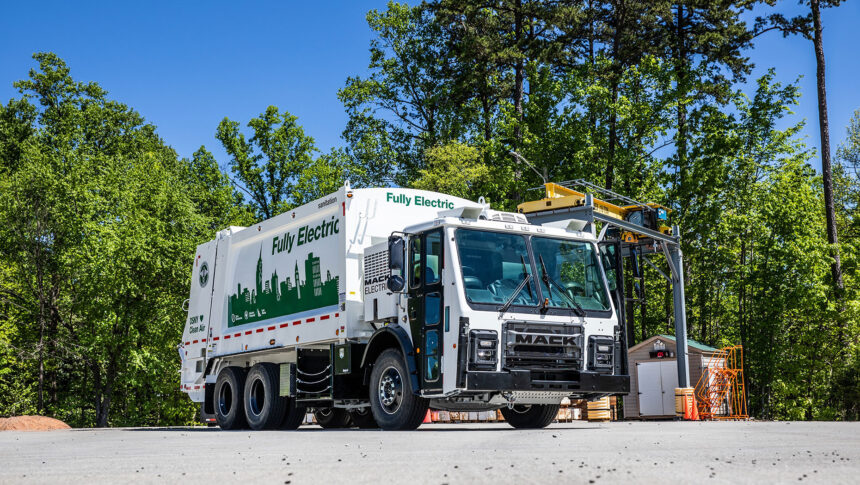Electric Truck sales are soaring in China, with the nation predicted to reach a game-changing milestone by 2028. According to Zeng Yuqun, the chairman of CATL (Contemporary Amperex Technology Co. Limited), electric truck adoption is expected to skyrocket—making up 50% of all heavy truck sales in the country within just four years. This is a huge jump from the projected 10% in 2024, a new dawn for China’s electric vehicle (EV) sector. The electric truck boom is no longer a gradual process—it’s a high-speed revolution powered by innovation, policy incentives, and environmental objectives. As the world’s largest commercial transport market, China will soon be at the forefront of electric truck uptake, battery innovation, and environmentally friendly logistics.
Read More: Wio Bank Strengthens Digital Vision with New Chairman
CATL’s Vision Ignites Electric Truck Frenzy
Electric truck momentum is gathering pace swiftly in China, and CATL is at the very epicenter of it. Zeng Yuqun’s ambitious prediction betrays increasing optimism in EV battery technology as well as China’s drive towards cleaner transportation. Electric truck sales, which previously commanded a zero market share, will grow to 10% by the end of 2024—and CATL estimates this will jump to 50% by 2028. This represents a huge change in the nation’s commercial vehicle market and sets electric trucks on the speedy path to claiming dominance on roads throughout the country.
CATL’s impact extends beyond forecasting. The company just introduced a battery-swapping initiative that will enhance the viability of electric trucks for long-haul freight operations. This solution eliminates one of range anxiety’s most significant roadblocks and the longest period of downtime associated with charging—two main obstacles that have slowed the adoption of electric trucks in the past. Electric trucks will be made more accessible, cost-effective, and appealing to freight companies throughout China by the battery-swapping option.
New Manufacturing Hub Fuels Electric Truck Infrastructure
Success for electric trucks depends a great deal on robust battery infrastructure, and CATL is making aggressive strides toward constructing it. It broke ground on a huge 60-gigawatt-hour EV battery and energy storage plant in Shandong province—its first large-scale production plant in northern China. But that’s just the start. CATL plans to construct a multi-phase battery manufacturing cluster costing billions of yuan, turning Shandong into a battery innovation center.
Shandong’s administration is also in, hoping to construct a lithium battery sector worth more than 100 billion yuan (around $14 billion) by the end of this year. From electrode materials to battery assembly, the province is heavily investing in every segment of the supply chain required to power electric trucks. As electric truck orders rise, this infrastructure will be vital in fueling China’s transition away from diesel and gasoline-fueled logistics.
Also Read: Savings Accounts Controversy: Capital One Pays $425 Million
Electric Trucks Challenge Diesel as LNG Gains Ground
The boom in electric trucks doesn’t only influence EV manufacturers—it’s disrupting the entire heavy transport fuel ecosystem. Electric truck adoption increasing and LNG truck usage gaining ground means diesel is quickly losing its grip in China’s logistics sector. Zeng Yuqun noted that the synergy of electric trucks. LNG cars will sharply reduce conventional fuel demand in the next few years.
People increasingly regard electric trucks not only as an option but also as a more intelligent, cleaner, and greener solution. China’s green policies and carbon neutrality ambitions are propelling this change. It provide electric truck makers and EV battery makers with the advantage. As rivalry with LNG trucks persists, the long-term advantages of electric trucks for lowering emissions and operating expenses continue to make them focal points.
Electric Truck Growth Brings Opportunities—and Challenges
The Chinese electric truck revolution presents a huge opportunity for investors, manufacturers, and trucking companies. With battery technology becoming mature and government incentives intensifying, the ground is ready for the large-scale adoption of electric trucks. CATL’s dominance in battery swapping and mega-manufacturing indicates how private enterprises are creating the future of electric trucks.
But still, there are challenges. Charging network still has to catch up in scale. Battery recycling technology needs to be invented. And current logistics infrastructure must change to support an influx of electric truck use. But for all these obstacles, the electric truck surge is inevitable.
As Chinese adoption of electric trucks accelerates. CATL’s ambitious 2028 plan is becoming a blueprint for a greener, more intelligent transport future. From reducing emissions to revolutionizing fuel demand, the electric truck is not only the future but also the present.
For More Trending Business News, Follow Us 10xtimes News






